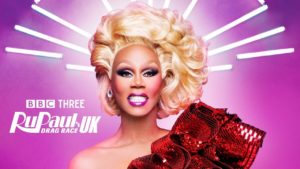Mama Ru has a treat for you, and the research proves it’s good for you!
Date 22.09.2021
22.09.2021
RuPaul’s Drag Race UK season three returns to BBC Three on Thursday, 23 September, at 7pm.
To celebrate the twelve fabulous drag queens sashaying into the werk room for the first time for series three, Claire Leer, Senior Lecturer in Events Management and Tourism, blogs about the research she’s involved in, which explores the positive impact drag events can have on mental health and wellbeing.

Claire said: “In the 90’s RuPaul rose to fame as a drag performer, in 2009 he launched an American reality competition TV series called RuPaul’s Drag Race, which catapulted drag into the mainstream media. The show, now in its thirteenth series, has won several acclaimed entertainment awards and led to spin off shows, including a UK show, first aired in 2019. The show sees contestants compete against each other in a variety of challenges. The winner is selected by RuPaul, who’s accompanied by his celebrity judging panel. As the series progresses the contestant’s life stories are uncovered as they share their personal journeys, challenges, and mental health struggles.
The shows have catapulted the contestants to international stardom and led to an exponential rise in drag events. RuPaul, recognised as a drag icon, has been the catalyst for the explosion of drag as an art form that has gained undeniable acceptance and popularity in mainstream society.
Drag shows, historically attended by gay men, were perceived as taboo and perverse events embedded into the LQBTQ+ community. The rise in the popularity of RuPaul’s Drag Race has undeniably led to a shift in the audience demographics. It’s more diverse, with many fans being young, straight females. This shift intrigued me. During dinner at an events management academic conference, I encountered some fellow RuPaul’s Drag Race fans. Our conversation led us to question how this change in the audience profile at drag shows had occurred and why these events were attracting a more diverse crowd. Was this purely attributable to RuPaul? Why were these LGBTQ+ events attracting people from outside of this community? Hence, our research commenced.
We surveyed 250 people who’ve attended a drag event in the UK. Over two-thirds of respondents were female with a quarter being straight. Most were introduced to drag by RuPaul’s Drag Race, particularly those who identified as heterosexual. And, whilst many celebrate this evolving diversity some are less welcoming. Numerous gay males appeared somewhat aggrieved that this ‘new’ audience didn’t appreciate or understand the history of drag culture. There were further remarks of discontent that the performers were imitating and replicating those on RuPaul’s Drag Race leading to drag events becoming commercialised. However, the majority welcomed this new and diverse audience which has created a supportive community, one that transcends sexuality and gender.
Our overriding key finding was that attending drag events has a hugely positive impact on happiness and mental wellbeing. We commenced our research pre-pandemic and whilst analysing our findings we entered lockdown. A time when events abruptly ceased. I reflected that many people had the sudden realisation that events have a positive impact on mental wellbeing. Many people attend events with friends/family, it’s a time to have fun, socialise and escape from everyday life. Our respondents said that drag events create an atmosphere of acceptance and openness, providing a safe, non-judgmental space. This inclusive environment encourages liberation and self-expression, which boosts attendees’ confidence, thus having a positive impact on happiness and mental wellbeing. This is attributed to the attendees feeling included and ultimately creating a sense of belonging. Attending drag events had a profound impact on some respondents. It allowed some to have the confidence to ‘come out’. The realisation that there were ‘others’ that were similar created a euphoric moment. Creating an environment without fear, rejection, or prejudice.
“It’s completely changed my life and saved me from a very dark place. Seeing drag has allowed me to see the world in colour again and this is why I continue to attend drag events” (Male, age 22-25, Heterosexual).
Drag events have become an accepted form of entertainment and a part of mainstream society and popular culture in the UK. RuPaul has instigated this change, attracting audience members from outside the LGBTQ+ community. This has provided a platform for dispelling the taboo’s surrounding drag. Due to the more commercial nature of drag as an art form, there has been an increase in events to celebrate this which has a positive impact on attendee mental wellbeing.
As series three of RuPaul’s Drag Race UK sashays onto our screens, I yearn for the return of drag events. We need a happiness boost!